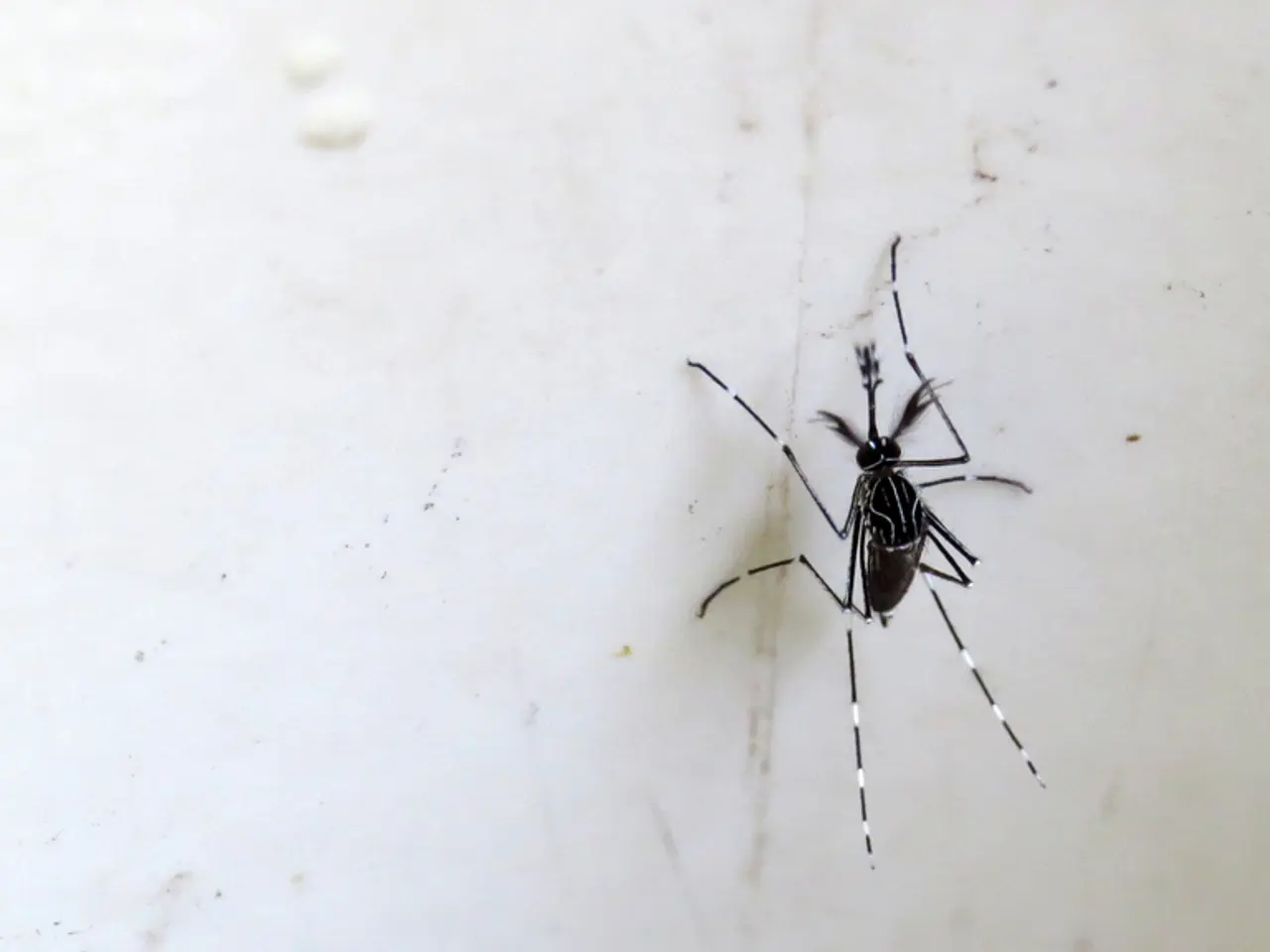Mosquito Alert: The Asian Tiger Mosquito Returns to Fellbach
Fellbach, a city in the Rems-Murr district of Germany, has recently detected the Asian tiger mosquito, a species known for its ability to transmit dengue, Zika, and chikungunya viruses. Two specimens of the mosquito were confirmed by the health department, prompting a call for active participation from the community to combat the potential spread.
The city urges residents to avoid standing water, cover rain barrels, regularly empty birdbaths, and report any sightings. Bti tablets are recommended for permanently water-filled vessels only if an infestation has been confirmed.
The Asian tiger mosquito, originally from Southeast Asia, can permanently establish itself in densely populated areas. Kernen in the Remstal is a model for organized resistance against the mosquito, with an action program that includes information events and projects like "Street patrons". Other cities in the district, such as Waiblingen and Weinstadt, have also reported findings.
Stuttgart-Weilimdorf has become a symbol of the spread of the Asian tiger mosquito, with the mosquito spreading further into the city area. The mosquito is extremely adaptable and has spread worldwide through global trade. The entire district is considered a potential establishment area for the Asian tiger mosquito.
Preventing Asian tiger mosquito breeding at home involves rigorous removal of water sources, landscape management to reduce resting sites, proper use of physical barriers and repellents, and applying biological or traditional control methods as supplementary tools. For more precise and localized guidance, contacting Fellbach's municipal health department or environmental services can provide concrete outbreak updates and recommend community or household-level actions tailored to the situation.
While the risk of infection from the Asian tiger mosquito is currently low, it is not zero. The goal of the action program in Kernen is to recognize, eliminate breeding grounds, and sensitize neighbors. Findings can be directly reported to KABS e.V. with a photo for inclusion in the nationwide monitoring.
Waiting now risks a mosquito season with consequences. Fellbach is at a tipping point, with only two findings so far. The tropical tiger mosquito is also spreading in the Rems-Murr district. Residents are urged to take action to protect themselves and their communities from the Asian tiger mosquito.
For more information about the Asian tiger mosquito outbreak in Fellbach, Germany, check local public health or municipal websites for Fellbach or the Baden-Württemberg region, as they often provide official updates on mosquito outbreaks and control measures. News outlets covering regional events may also report on the outbreak situation. Additionally, scientific publications or entomology research institutions in Germany could have studies or reports on invasive mosquito species like Aedes albopictus (Asian tiger mosquito) in that area.
- Science plays a crucial role in understanding the Asian tiger mosquito and its potential impact on health and wellness.
- Workplace-wellness programs can educate employees about preventive measures against mosquito-borne diseases.
- Medical conditions like chronic diseases and neurological disorders can be worsened by mosquito bites, according to environmental science literature.
- Cancer research may also be affected as some studies link mosquito-borne illnesses to certain types of cancer.
- Respiratory conditions could be aggravated due to allergies caused by mosquito bites.
- Digestive health is another area that could be affected as mosquito-borne viruses can cause abdominal pain and nausea.
- Eye health is at risk, as some mosquito species can transmit eye infections.
- Hearing loss can even be a side effect of some treatments for mosquito-borne diseases.
- The entire health and wellness industry should be aware of the potential threats posed by invasive mosquito species like the Asian tiger mosquito.
- Fitness and exercise regimens should be modified during peak mosquito seasons to limit outdoor activities at dusk and dawn, when mosquitoes are most active.
- Autoimmune disorders can make individuals more susceptible to mosquito-borne diseases.
- Climate change affects the distribution and proliferation of mosquito species, potentially increasing the spread of mosquito-borne diseases.
- The manufacturing industry is not immune to mosquito infestations, which can disrupt production and pose health risks to workers.
- Mental health can be impacted by fear and anxiety related to mosquito-borne diseases.
- Skin care products can offer some protection against mosquito bites.
- Therapies and treatments for mosquito-borne diseases are an active area of research in the medical field.
- Proper nutrition can help strengthen the immune system, reducing the risk of complications from mosquito-borne diseases.
- Cardiovascular health can be affected due to the inflammation caused by mosquito bites.
- The entire industry, from retail to transportation, should adopt measures to prevent mosquito breeding.
- Cybersecurity measures can assist in monitoring and tracking the spread of mosquito-borne diseases.
- Lifestyle choices can significantly affect the risk of mosquito-borne diseases, including the choice of residence, clothing, and outdoor activities.
- Fashion and beauty trends should consider mosquito-repellent materials in clothing and accessories.
- Food and drink consumption can contribute to overall health and thus, resistance to mosquito-borne diseases.
- Investing in companies that prioritize workplace wellness and environmental safety can be beneficial in the long run.
- Wealth management strategies should take into account potential health costs associated with mosquito-borne diseases.
- Home and garden improvements can reduce mosquito breeding grounds and provide a healthier living environment.
- Businesses must ensure compliance with environmental regulations to prevent mosquito proliferation.
- Personal finance should prioritize emergency funds for unforeseen health expenses, including treatments for mosquito-borne diseases.




